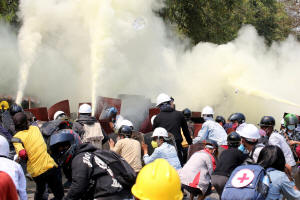Two protesters killed in Myanmar, shops and factories closed
 Send a link to a friend
Send a link to a friend
 [March 08, 2021]
(Reuters) - Two demonstrators were
killed by gunshot wounds to the head in Myanmar on Monday, witnesses
said, while shops, factories and banks were closed in the main city
Yangon as part of the protests against the country's military rulers. [March 08, 2021]
(Reuters) - Two demonstrators were
killed by gunshot wounds to the head in Myanmar on Monday, witnesses
said, while shops, factories and banks were closed in the main city
Yangon as part of the protests against the country's military rulers.
Security forces were also deployed at hospitals and universities as part
of efforts to enforce the law, state media said.
It was not immediately clear who fired on the protesters in the northern
town of Myitkyina, although both police and the military were at the
scene, the witnesses said.
Photos posted on Facebook showed the bodies of two men lying on the
street. Witnesses said they were taking part in a protest against the
coup when police fired stun grenades and tear gas. Several people were
then hit by gunfire from nearby buildings.
One witness, who said he helped move the bodies, told Reuters two people
were shot in the head and died on the spot. Three people were wounded.

"How inhumane to kill unarmed civilians," said the witness, a
20-year-old man. "We must have our right to protest peacefully."
Police and military have killed more than 50 people to quell the daily
demonstrations and strikes against the Feb. 1 coup, according to the
United Nations.
A military spokesman did not respond to calls asking for comment on the
latest incidents.
Myanmar has been in turmoil since the army overthrew the elected
government of longtime democracy champion Aug Sang Suu Kyi, detained her
and other political figures, and installed a military government.
The generals say they acted because an election in November which saw
Suu Kyi's National League for Democrcay (NLS) secure a a big victory was
marred by fraud - a claim rejected by the electoral commission.
They have promised to hold another election, without giving a date. In
the meantime, security forces have cracked down hard on widespread
pro-democracy protests, with last week the bloodiest so far in a country
that has a history of military rule and crushing of dissent.
SARONG FLAGS
On Monday, demonstrators gathered in Yangon and in the second-biggest
city Mandalay and several other towns, according to videos.
Protesters in Dawei, a coastal town in the south, were protected by the
Karen National Union, an ethnic armed group engaged a long-running war
with the military.
In some places, they waved flags fashioned from htamain (women's
sarongs) or hung them up on lines across the street to mark
International Women's Day while denouncing the junta. Walking beneath
women's sarongs is traditionally considered bad luck for men.
Witnesses reported sounds of gunfire or stun grenades in many districts
of Yangon after nightfall as soldiers set up camp in hospitals and
university compounds. It was not clear whether anyone was hurt.
"The army just started shooting," a businessman who lives near a Yangon
hospital told Reuters. He said he was staying at home with his family.
"We cannot go out, we cannot go to work, or even leave. We are are not
safe, but we cannot go out."
The international Physicians for Human Rights (PHR) organisation
protested against the occupation of the hospitals, which it said was a
violation of international law.
"This widespread siege of hospitals follows several days of prominent
civilian injuries and casualties, and can be interpreted as a direct
attempt to impede access to care for civilians. It is also a threat to
attending medics to warn them against further treating injured
protestors," the New York-based PHR said in a statement.
[to top of second column]
|

Tear gas and fire extinguisher gas float around demonstrators during
a protest against the military coup in Naypyitaw, Myanmar, March 8,
2021. REUTERS/Stringer

It also said security forces were conducting night raids in Yangon,
including arbitrary arrests, shootings, and beatings.
STOP WORK
At least nine unions covering sectors including construction,
agriculture and manufacturing have called on "all Myanmar people" to
stop work to reverse the coup and restore Suu Kyi's government.
Allowing business and economic activity to continue would help the
military "as they repress the energy of the Myanmar people", the
unions said in a statement.
"The time to take action in defence of our democracy is now."
Only a few small tea-shops were open in Yangon, witnesses said.
Shopping centres were closed and there was no work going on at
factories.
An NLD official and local campaign manager, Khin Maung Latt died in
police custody on Sunday. Ba Myo Thein, a deposed lawmaker, said
reports of bruising to Khin Maung Latt's head and body raised
suspicions that he had been "tortured severely".
Police in the Pabedan district of Yangon, where Khin Maung Latt was
arrested on Saturday night, declined to comment. A spokesman for the
military did not answer calls seeking comment.
The army has said it is dealing with protests lawfully.
Figures by the Assistance Association for Political Prisoners
advocacy group showed nearly 1,800 people have been detained under
the junta as of Sunday.
An announcement by the military carried on the front page of the
State-run Global New Light of Myanmar newspaper on Monday threatened
unspecified action against anyone who directly or indirectly works
for a committee of ousted lawmakers that has declared itself the
country's legitimate authority.
The announcement said the committee was illegal and had committed
"high treason".
The killings have drawn anger in the West and been condemned by most
democracies in Asia.
The United States and some other Western countries have imposed
limited sanctions on the junta and Australia on Sunday cut defence
ties, saying it would only deal with non-government groups in
Myanmar.

Neighbouring China said on Sunday it was prepared to engage with
"all parties" to ease the crisis and was not taking sides.
In Sweden, H&M HMb.ST, the world's second-biggest fashion retailer,
said it had paused placing orders with its direct suppliers in
Myanmar.
H&M said it was shocked by the use of deadly force against
protesters, but also that the unpredictable situation had caused
difficulties in its manufacturing and transport operations.
So far, however, the military has brushed off international
condemnation of its actions and is digging in to weather the crisis,
as it has in past periods of army rule.
(Reporting by Reuters Staff; Writing by Martin Petty, Poppy
McPherson and Raju Gopalakrishnan; Editing by Lincoln Feast and
Angus MacSwan)
[© 2021 Thomson Reuters. All rights
reserved.] Copyright 2021 Reuters. All rights reserved. This material may not be published,
broadcast, rewritten or redistributed.
Thompson Reuters is solely responsible for this content. |